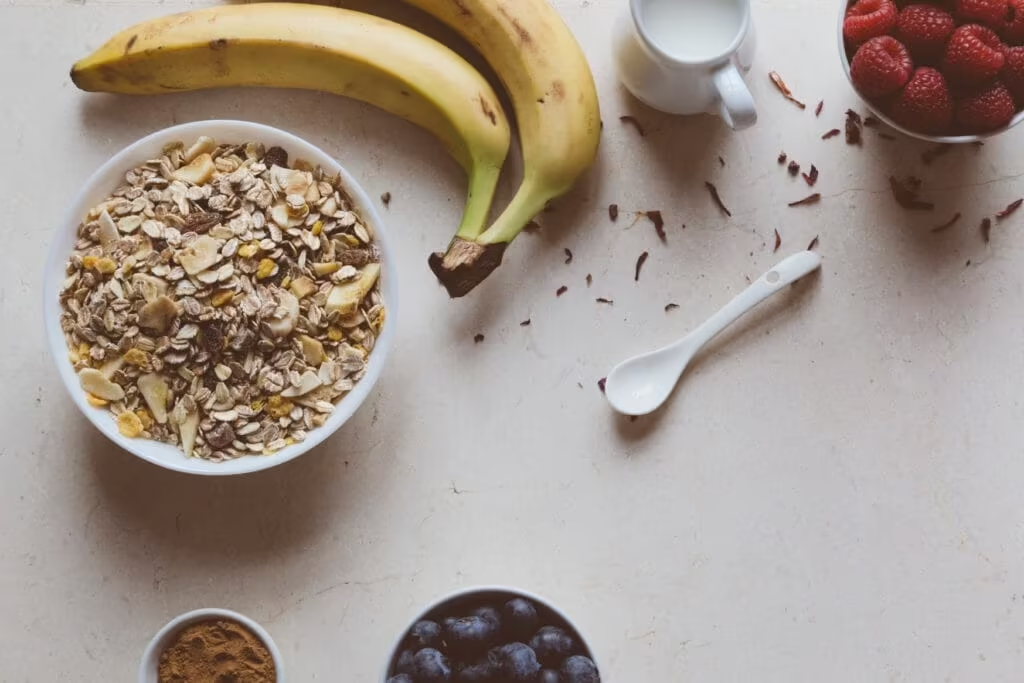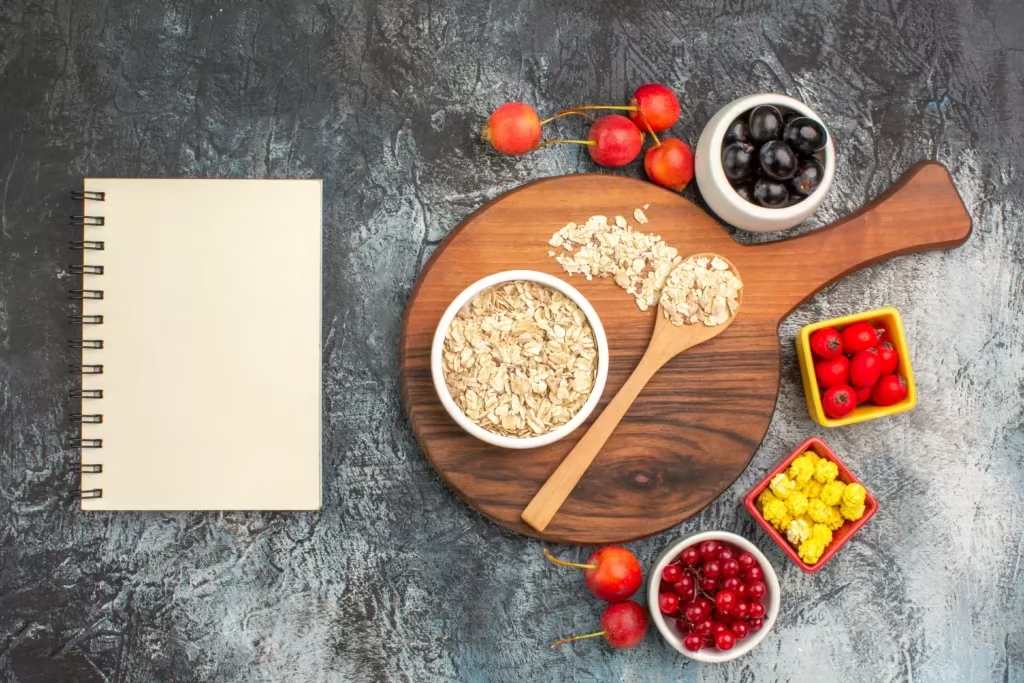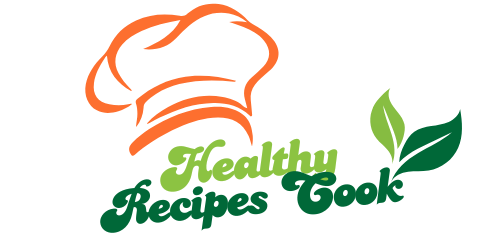Oats: A Superfood for All
The health benefits of oats and oatmeal are truly impressive. This nutrient-rich grain supports heart health, weight loss, digestion, and energy levels, making it a must-have in any balanced diet.
Rich in fiber, protein, and essential vitamins, oats help lower cholesterol, regulate blood sugar, and keep you full for longer. Whether you prefer them as a classic bowl of oatmeal, blended into smoothies, or baked into healthy treats, oats offer endless possibilities for a delicious and nutritious lifestyle.
Now, let’s dive into why oats deserve a place in your daily routine!
“Oats are a powerhouse of nutrients, providing fiber, protein, and essential minerals in every bite.”
Table of Contents
🌾 What Are Oats?
Oats (Avena sativa) are a type of whole grain that has been cultivated for thousands of years. They are primarily grown in North America and Europe, and they’ve been a dietary staple due to their high nutritional value and versatility.
Unlike refined grains, oats are minimally processed, meaning they retain most of their fiber and essential nutrients. But not all oats are the same! Here’s a quick breakdown of the most common types:
- Whole Oat Groats – The least processed form, requiring long cooking times.
- Steel-Cut Oats – Chopped groats that cook faster while maintaining a chewy texture.
- Rolled Oats (Old-Fashioned Oats) – Steamed and flattened for quicker cooking.
- Instant Oats – The most processed type, cooking in minutes but often containing added sugar.
No matter which type you choose, oats remain a nutritional powerhouse!
📜 A Brief History of Oat Consumption
Oats date back to around 2,000 BC, with evidence suggesting they were first cultivated in ancient China and Egypt. However, it was the Scottish and Irish populations who popularized oatmeal as a staple breakfast dish.
Fun fact: The Romans considered oats to be “barbarian food” because they were mainly consumed by Germanic tribes. Fast forward to today, and oats are now celebrated worldwide for their health benefits and versatility.
🥦 Nutritional Profile of Oats
Oats are packed with essential nutrients that support overall health. Let’s break down their macronutrient and micronutrient content:
🔬 Macronutrients in Oats
A 100g serving of oats provides:
✅ Carbohydrates: ~66g (great for sustained energy)
✅ Protein: ~13g (more than most grains!)
✅ Fats: ~6.5g (mostly healthy unsaturated fats)
✅ Fiber: ~10g (soluble & insoluble)
The high fiber content, particularly beta-glucan, is what makes oats so special. This soluble fiber helps lower cholesterol and supports digestion.
💊 Vitamins and Minerals in Oats
Oats are also rich in essential micronutrients like:
- Magnesium – Supports muscle and nerve function.
- Phosphorus – Essential for strong bones.
- Iron – Prevents anemia and supports oxygen transport.
- Zinc – Boosts immunity and promotes wound healing.
- B-Vitamins (B1, B5, B6, Folate) – Improve energy production and brain function.
❤️ Top Health Benefits of Oats and Oatmeal
Now, let’s talk about what makes oats truly amazing for your health!
🫀 1. Supports Heart Health and Lowers Cholesterol
One of the biggest benefits of oats is their ability to lower LDL (bad) cholesterol. Thanks to beta-glucan fiber, oats help:
✔ Reduce cholesterol absorption in the intestines.
✔ Decrease the risk of heart disease and stroke.
✔ Improve blood pressure levels.
Studies show that consuming just 3 grams of beta-glucan fiber daily (about a bowl of oatmeal) can significantly reduce cholesterol.
“Adding a bowl of oatmeal to your morning routine is like giving your heart a daily hug!” 💙
👉 Read More: Eat Oatmeal Three Times a Day to Lose Weight

⚖ 2. Aids in Weight Management
Oats are fantastic for weight loss because they:
✅ Keep you full for longer due to their high fiber content.
✅ Regulate blood sugar levels, preventing cravings.
✅ Provide slow-releasing energy to reduce overeating.
A study published in the Journal of Nutrition found that people who ate oatmeal for breakfast consumed fewer calories throughout the day compared to those who ate sugary cereals.
👉 Read More: Oatmeal for Weight Loss
🌿 3. Boosts Digestive Health
If you struggle with bloating or constipation, oats might be the solution. Their high fiber content:
✔ Promotes healthy gut bacteria.
✔ Helps with regular bowel movements.
✔ Reduces the risk of digestive disorders like IBS.
Beta-glucan acts as a prebiotic, feeding good bacteria in your gut and improving digestion.
🍬 4. Helps Regulate Blood Sugar Levels
For those with diabetes or insulin resistance, oats can be a game-changer! Their low glycemic index (GI) means they:
✅ Slow down sugar absorption.
✅ Prevent blood sugar spikes.
✅ Improve insulin sensitivity.
Adding cinnamon and nuts to your oatmeal can further stabilize blood sugar!
🌟 5. Enhances Skin Health
Did you know oatmeal is great for your skin? That’s why it’s often used in skincare products!
🛁 Oats soothe irritated skin (great for eczema).
💧 They act as a natural moisturizer.
🛡️ Help treat acne and inflammation.
Oat-based face masks are a natural way to nourish your skin!
⚡ 6. Provides Long-Lasting Energy
Oats are a fantastic source of sustained energy due to their complex carbs. Unlike sugary cereals that lead to energy crashes, oatmeal keeps you alert and fueled for hours.
This makes oats the perfect breakfast for athletes, students, and busy professionals.
👉 Read More: Kodiak Oatmeal: High-Protein Superfood
🌾 Common Problems, Myths & How to Include More Oats in Your Diet
In Part 1, we explored the nutritional powerhouse that is oats and their incredible health benefits. But despite their popularity, many people have concerns about oats – Are they gluten-free? Can they cause bloating? Are all oats the same?
Let’s bust some common myths, address frequent problems, and uncover delicious ways to add oats to your daily routine!
❌ Common Problems & Misconceptions About Oats
While oats are often praised for their health benefits, there are a few concerns that some people have when consuming them. Let’s clear up the confusion!
🌾 1. Are Oats Gluten-Free?
This is one of the biggest misconceptions about oats. The short answer? Yes, but with a catch!
Oats naturally do not contain gluten, making them safe for most people. However, many oats are processed in facilities that also handle wheat, barley, and rye, leading to cross-contamination.
Solution: If you have celiac disease or gluten sensitivity, look for certified gluten-free oats to avoid contamination.
“Not all oats are gluten-free by default, but certified gluten-free oats are a safe option for those with gluten intolerance.”
👉 Read More: Is Eating Oatmeal Every Day Healthy?
🤔 2. Can Oats Cause Bloating or Digestive Issues?
Some people report bloating or stomach discomfort after eating oats. Why?
✔ High fiber content – If your body isn’t used to fiber, too much at once can cause bloating.
✔ Beta-glucan fermentation – This fiber ferments in the gut, producing gas.
✔ Added ingredients – Instant oatmeal with sugar, artificial flavors, and dairy can upset digestion.
Solution:
✅ Increase oat intake gradually to help your gut adjust.
✅ Choose plain oats over flavored ones.
✅ Drink plenty of water to help fiber move through your system.
🏷️ 3. Are All Oats Created Equal?
Many people think instant oats, rolled oats, and steel-cut oats are nutritionally identical. While they all come from the same grain, processing affects their nutrition and impact on blood sugar.
| Type of Oats | Processing Level | Cooking Time | Glycemic Index (GI) | Best For |
|---|---|---|---|---|
| Steel-Cut Oats | Least processed | 20-30 min | Low GI (best for blood sugar control) | Long-lasting energy |
| Rolled Oats | Moderately processed | 5-10 min | Medium GI | Balanced nutrition |
| Instant Oats | Most processed | 1-2 min | High GI (can spike blood sugar) | Quick meals, but check ingredients |
Solution: Stick to steel-cut or rolled oats for the most health benefits and avoid instant oats with added sugar.
🍽️ How to Include More Oats in Your Diet
Bored of plain oatmeal? There are countless creative ways to add oats to your diet. Here are some fun and delicious ideas!
🥣 1. Delicious Oatmeal Recipes for Breakfast
Oatmeal doesn’t have to be boring! Try these tasty variations:
🍏 Apple Cinnamon Oatmeal
- ½ cup rolled oats
- 1 cup almond milk
- ½ apple, chopped
- 1 tsp cinnamon
- 1 tbsp honey
How to make it:
1️⃣ Cook oats in almond milk.
2️⃣ Stir in chopped apples, cinnamon, and honey.
3️⃣ Enjoy a cozy, fiber-packed breakfast!
🥜 Peanut Butter Banana Oatmeal
- ½ cup oats
- 1 cup milk
- ½ banana, sliced
- 1 tbsp peanut butter
- 1 tsp chia seeds
How to make it:
1️⃣ Cook oats with milk.
2️⃣ Stir in peanut butter and banana.
3️⃣ Sprinkle chia seeds on top for extra nutrition.
“Oatmeal is like a blank canvas – add your favorite toppings and make it your own!”
👉 Read More: Pumpkin Oatmeal Cookies Recipe
🍪 2. Creative Ways to Use Oats Beyond Oatmeal
Oats aren’t just for breakfast – you can bake, blend, and cook with them in a variety of dishes!
🥞 Oat Pancakes
Mix oats into your pancake batter for a fiber-rich breakfast.
🍪 Healthy Oat Cookies
Swap regular flour for blended oats in cookie recipes.
🥤 Oat Smoothies
Add a tablespoon of oats to your smoothies for extra fiber and a thicker texture.
🍚 Oat Flour in Baking
Blend oats into flour to use in muffins, pancakes, and bread.
🍗 Oats as a Breadcrumb Substitute
Use crushed oats as a healthier alternative to breadcrumbs for coating chicken or fish.
🌙 3. Overnight Oats: The Perfect Meal Prep Breakfast

Short on time in the morning? Overnight oats are a game-changer!
🍓 Classic Overnight Oats Recipe
- ½ cup rolled oats
- 1 cup almond milk
- 1 tbsp chia seeds
- 1 tsp honey
- ½ cup berries
How to make it:
1️⃣ Mix all ingredients in a jar.
2️⃣ Refrigerate overnight.
3️⃣ Enjoy a ready-to-eat, nutritious breakfast in the morning!
“Overnight oats = breakfast with zero effort!”
❓ Frequently Asked Questions (FAQs) About Oats
🧐 1. Can I Eat Oatmeal Every Day?
Absolutely! Oats are one of the healthiest grains you can eat daily. They provide:
✔ Essential nutrients like fiber, protein, and vitamins.
✔ Heart health benefits by lowering cholesterol.
✔ Digestive support with high fiber content.
Just make sure to switch up your toppings and preparation methods to keep things interesting!
👉 Read More: Is Eating Oatmeal Every Day Healthy?
🍽️ 2. What’s the Healthiest Way to Eat Oats?
The healthiest way to eat oats depends on your goals:
🥣 For heart health → Choose steel-cut or rolled oats with nuts and berries.
🥄 For weight loss → Stick to plain oats and avoid sugary instant oatmeal.
💪 For muscle gain → Add protein powder, peanut butter, or Greek yogurt.
Pro Tip: Avoid instant oats with added sugar and artificial flavors!
💪 3. Are Oats Good for Muscle Building?
Yes! Oats are an excellent source of complex carbohydrates and protein, making them ideal for athletes and gym-goers.
🏋️ Why oats are great for muscle building:
✔ Slow-digesting carbs provide long-lasting energy.
✔ Rich in protein (~13g per 100g serving).
✔ High in magnesium & phosphorus, which aid muscle recovery.
Combine oats with protein-rich toppings like nuts, yogurt, and seeds for the best results!
🚀 4. Are Overnight Oats as Healthy as Cooked Oatmeal?
Yes, overnight oats retain the same nutrients as cooked oats. In fact, they may even be easier to digest since soaking breaks down phytic acid, allowing your body to absorb nutrients more efficiently.
Best overnight oat add-ins for extra nutrition:
✔ Chia seeds for omega-3s
✔ Greek yogurt for protein
✔ Berries for antioxidants
🌾 5. Can I Eat Oats on a Gluten-Free Diet?
Yes, as long as you buy certified gluten-free oats! Regular oats can be cross-contaminated with gluten during processing.
Best brands for gluten-free oats:
✅ Bob’s Red Mill Gluten-Free Oats
✅ Quaker Gluten-Free Oats
✅ Nature’s Path Organic Oats
Always check labels if you have celiac disease or gluten sensitivity!
🥗 6. Can I Use Oats for Savory Dishes?
Yes! While oats are often associated with sweet breakfasts, they work great in savory meals too!
🍽️ Savory Oatmeal Recipe:
- ½ cup steel-cut oats
- 1 cup vegetable broth
- 1 fried egg
- ½ avocado, sliced
- Sprinkle of cheese
How to make it:
1️⃣ Cook oats in broth instead of water.
2️⃣ Top with a fried egg, avocado, and cheese.
3️⃣ Enjoy a nutrient-packed, savory meal!
🌟 Final Thoughts: Why Oats Deserve a Place in Your Diet
Oats are truly a superfood that benefits your heart, digestion, weight, and energy levels. Whether you enjoy them as a warm bowl of oatmeal, blended into smoothies, or baked into delicious treats, oats offer endless possibilities.
🏆 Top Reasons to Eat Oats Daily:
✔ Heart Health – Lowers bad cholesterol.
✔ Weight Management – Keeps you full longer.
✔ Digestive Benefits – Promotes gut health.
✔ Energy Boost – Provides long-lasting fuel.
✔ Affordable & Versatile – Easy to prepare and budget-friendly.
So, what’s stopping you? Make oats a part of your daily routine and enjoy the health benefits they bring!
“Oats are proof that the simplest foods can be the most powerful.”
📌 Related Articles for More Inspiration:
🚀 Enjoy your oats and stay healthy! 🥣💪

